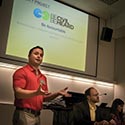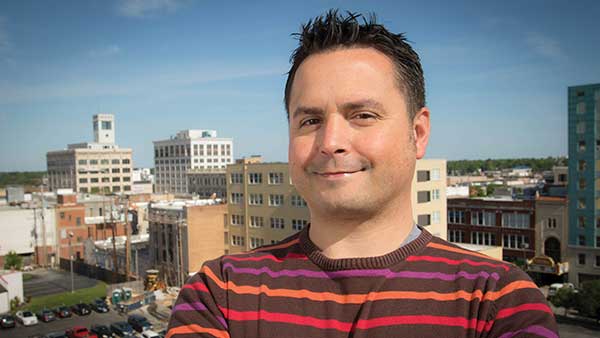Stout, associate professor of sociology and director of the Center for Community Engagement, vividly remembers walking past this area as an undergraduate student at Temple University on his way to class in a high-poverty area of the city.
Stout came from a fairly typical middle class background, so what he saw astonished him.
“It had a tremendous impact on the way that I viewed things, like differences in educational opportunities and outcomes,’ Stout said.
“It taught me a lot about how, just by virtue of the family I was born into and the community and neighborhood that I lived in, I had certain advantages and opportunities growing up that a large number of people didn’t have.”
Now he’s a pioneer in the research of social capital — the concept that some resources are accessed more readily through connections and trust with other individuals.
Throughout his career, he has repeatedly seen that a more diverse group of social connections — including friends, neighbors and colleagues from a variety of backgrounds — opens up more opportunities and encourages feelings of efficacy for all involved.
Checking out the civic health of Missourians
Since 2010, a primary focus of research for Stout has been the production of the statewide Civic Health Index. The second index was released in 2013, with another tentatively scheduled for this year.
This index looks at levels of participation in public forums, volunteer opportunities, neighborhood collaboration, voter registration, voter turnout and involvement in nonelectoral political activities.
These factors reveal a picture of how engaged citizens are in their communities and how much they invest in making their communities better.
“What the Civic Health Index is examining is the health of the nonprofit sector — sometimes called civil society — and it shows us that the private, public and nonprofit sectors don’t operate in isolation.”
“How our community is doing influences how representative our politics are. How our economic institutions are functioning determines how stable our communities are. How our economic sector influences our political sector determines the resources that flow through civil society, versus flowing through the private sector, and so on.”
Creating the Center for Community Engagement
In fall 2014, Missouri State University’s Center for Community Engagement was established. Stout was named its first director.
He has made huge strides on building partnerships for the center, securing funding and gaining momentum behind projects and studies that will be done — all for the greater good.
“The Center for Community Engagement here at Missouri State is the first such partner of the National Conference on Citizenship in the country. What I’m really trying to do is — locally, regionally, statewide and nationally — weave Missouri State as one of the central nodes for research and practice on social capital and civic engagement in the country. That’s kind of the bigger goal.”
Initial study has led to changes in community

In 2010, Dr. Mike Stout and several collaborators initiated the Ozarks Regional Social Capital Study to examine social capital and citizen participation in southwest Missouri.
They found that people in the region tend to have many interpersonal connections, high levels of participation in voluntary groups (especially faith-based organizations) and high levels of trust in others.
However, they also found that in the Ozarks there are relatively lower levels of civic engagement compared to the national average.
“(The study) influenced the way people talk about issues in the local community, has led – indirectly and directly – to new positions and resources in city government, and has highlighted civic engagement (in Springfield),” Stout said.
Photos by Bob Linder


Leave a Reply